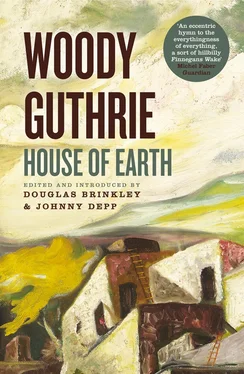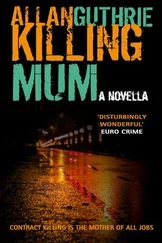Scholars who devote themselves to Woody Guthrie are continually amazed by how much unpublished work the Oklahoma troubadour left behind. He had an unerring instinct for social justice, and he was a veritable writing machine. During his fifty-five years of life, he wrote scores of journals, diaries, and letters. He often illustrated them with good-hearted cartoons, watercolor sketches, and comical stickers. Then there are the memoirs and his more than three thousand song lyrics. He regularly scribbled random ideas on newspapers and paper towels. And he was no slouch when it came to art. But House of Earth —in which wood is a metaphor for capitalist plunderers while adobe represents a socialist utopia where tenant farmers own land—is Guthrie’s only accomplished novel. The book is a call to arms in the same vein as the best ballads in his Dust Bowl catalog.
The setting for House of Earth is the mostly treeless, arid Caprock country of the Texas Panhandle near Pampa. This was Guthrie’s hard-luck country. He was proud that the Great Plains were his ancestral home. It’s perhaps surprising to realize that Guthrie of Oklahoma—who tramped from the redwoods of California to subtropical Florida throughout his storied career—first developed his distinctive writing style in the windswept Texas Panhandle. Guthrie’s treasured Caprock escarpment forms a geological boundary between the High Plains to the east and the Lower Plains of West Texas. The soils in the region were dark brown to reddish-brown sand, sandy loams, and clay loams. They made for wonderful farming. But the lack of shelterbelts—except the Cross Timbers, a narrow band of blackjack and post oak running southward from Oklahoma to Central Texas between meridians 96 and 99—left crops vulnerable to the deadly winds. Soil erosion became a plague, owing to misuse of the land by Big Agriculture, an entity that Guthrie wickedly skewers in the novel.
Guthrie, it seems, knew more about the Caprock country than perhaps any other creative artist who ever lived. He knew the local slang and the idioms of the Panhandle region, the secret hideaways, and the best fishing holes. Throughout House of Earth , Guthrie uses speech patterns (“or something like that”; “shore cain’t”; and “I wish’t I could”) with sure command. Exclamations such as “Whooooo” and “Lookkky!” help establish Guthrie’s populist credibility. He had lived with people very similar to the novel’s hardscrabble characters. His slang expressions are lures similar to those found in O. Henry’s folksy short stories. Building on Will Rogers’s large comedy repertoire, Guthrie, in a little pamphlet titled $30 Wood Help , gave a thumbnail impression of his beloved Lone Star State while carping about the lumber barons turned loan sharks. “Texas,” he wrote, “is where you can see further, see less, walk further, eat less, hitch hike further and travel less, see more cows and less milk, more trees and less shade, more rivers and less water, and have more fun on less money than anywhere else.”
House of Earth has a literary staying power that makes it more than just a curiosity: homespun authenticity, deep-seated purpose, and folk traditions are all apparent in these pages. Guthrie clearly knows the land and the marginalized people of the Lower Plains. In the novel, he draws portraits of four hard-luck characters all recognizable, or partly recognizable, to readers familiar with his songbook: the dutiful tenant farmer “Tike” Hamlin; his feisty pregnant wife, Ella May; a nameless inspector from the US Department of Agriculture (USDA) who asks farmers to slaughter their livestock to raise farm prices; and Blanche, a registered nurse. When Tike, full of discord, lashes out at his own ramshackle house—“Die! Fall! Rot!”—he is speaking for all of the world’s poor living in squalor. Like all of Guthrie’s work, which is often erroneously pigeonholed as mere Americana, this book is a direct appeal for world governments to help the hardest-hit victims of natural disasters create new and better lives for themselves. Guthrie contrives to let his readers know in subtle ways that capitalism is the real villain in the Great Depression. It’s reasonable to say that Guthrie's novel could just as easily have been set in a Haitian shantytown or a Sudanese refugee camp as in Texas.
It was desperation that first brought Guthrie to forlorn Pampa. He had been born on July 14, 1912, in Okemah, Oklahoma, but in 1927, after Woody’s mother was sent to Central State Hospital for the Insane in Norman (for what today would be diagnosed as Huntington’s disease), his father moved to the Texas Panhandle. Not only were the crops withered in the Oklahoma fields during the 1920s, but the oil fields were also drying up. Tragedy seemed to follow young Woody around like a thundercloud: his older sister, Clara, died in a fire in 1919; then a decade later the Great Depression hit the Great Plains hard, bringing widespread poverty and further dislocation. After spending much of his teens scraping out an existence in Oklahoma, Woody decided in 1929 to join his father in Pampa, a far-flung community in the Texas Panhandle populated largely by cowboys, merchants, itinerant day laborers, and farmers. The mostly self-educated Woody, who had taken to playing the guitar and harmonica for a living, married a Pampa girl, Mary Jennings, who was the younger sister of a friend, the musician Matt Jennings. They would have three children. An oil discovery in the mid-1920s unexpectedly turned Pampa into a boomtown. The Guthries ran a boardinghouse, hoping to capitalize on the prosperity.
Temperamentally unsuited to a sunup-to-sundown job, Guthrie—a slight man weighing only 125 pounds—played a handsome mandolin for tips or sandwiches in every dark juke joint, dance hall, cantina, gin mill, and tequilería from Amarillo to Tucumcari. Leftist and progressive-minded, Guthrie was determined not to let poverty beat him down. He considered himself a straight-talking advocate for truth and love like Will Rogers. With head cocked and chin up, he embodied the authentic West Texas drifter complaining about how rotten life was for the poor. He became a singing spokesman for the impoverished, the debt-ridden, and the socially ostracized. Comic absurdity, however, infused everything Guthrie did. “We played for rodeos, centennials, carnivals, parades, fairs, just bustdown parties,” Guthrie recalled, “and played several nights and days a week just to hear our own boards rattle and our strings roar around in the wind.”
Determined to be a good father to his first daughter, Gwendolyn, Guthrie tried to earn an honest living in Pampa. But he was restless and broke. For extra money, he painted signs for the local C and C Market. When not making music or drawing, he holed up in the Pampa Public Library; the librarian there said he had a voracious appetite for books. Longing to grapple with life’s biggest questions, he joined the Baptist church, studied faith healing and fortune-telling, read Rosicrucian tracts, and dabbled in Eastern philosophy. He opened for business as a psychic in hopes of helping locals with their personal problems. He wanted to be a fulfiller of dreams. His music, grounded in his dedication to improving the lives of the downtrodden, was sometimes broadcast on weekends from a shoe box–size radio station in Pampa. Depending on his mood at any moment, he could be a cornpone comedian or a profound country philosopher of the airwaves. But he was always pure Woody.
His tramps around Texas took him south to the Permian basin, east to the Houston-Galveston area, then up through the Brazos valley into the North Central Plains, and back to the oil fields around Pampa. Always pulling for the underdog, the footloose Guthrie lived in hobo camps, using his meager earnings to buy meals or to shower. He was proud to be part of the downtrodden of the southern zone. His heart swelled with his new social consciousness:
Читать дальше











